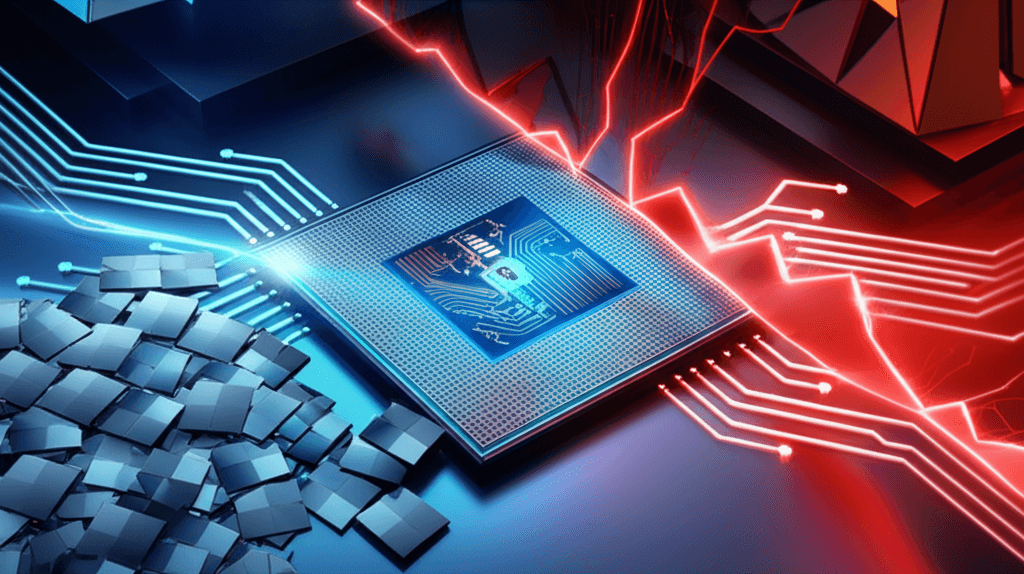China Blocks Nvidia's Custom AI Chips, Halting Production and Fueling Tech War
A geopolitical ping-pong match leaves 700,000 Nvidia AI chips stranded, fueling China's drive for tech self-sufficiency.
August 22, 2025

A high-stakes gamble by Nvidia to retain its foothold in the lucrative Chinese market has been upended, leaving hundreds of thousands of specialized artificial intelligence chips in limbo and production lines grinding to a halt. The company has reportedly stopped the production of its H20 AI chips, specifically designed to comply with stringent U.S. export controls, following a directive from Beijing that has strongly discouraged Chinese tech giants from purchasing the hardware. This sudden reversal throws into stark relief the precarious position of multinational technology firms caught in the escalating geopolitical rivalry between the United States and China, a conflict that is increasingly being fought with silicon wafers and semiconductor designs. An estimated 700,000 of these AI processors, once eagerly anticipated by Chinese customers, are now sitting idle, a costly monument to the unpredictable nature of the global tech supply chain.[1]
The journey of the H20 chip has been a tumultuous one, marked by seesawing policy decisions from Washington.[2] Nvidia, the world's leading designer of AI processors, created the H20 as a downgraded version of its more powerful H100 and Blackwell series chips, carefully engineered to fall within the performance thresholds set by the Biden administration's export rules.[3][2] After an initial period of sales, the U.S. Commerce Department abruptly halted exports of the H20 to China in April, citing concerns that the chips could be diverted for military use.[4][2] This ban forced Nvidia to record a substantial write-down of over $5 billion for its unsold inventory and sales commitments.[5] Then, in a surprising reversal in July, the Trump administration gave Nvidia the green light to resume sales, but with a significant and controversial condition: Nvidia and its rival AMD would have to give the U.S. government 15% of the revenue from certain advanced chip sales in China.[6][7][8] Following this approval, demand from Chinese firms appeared robust, prompting Nvidia to place an order for an additional 300,000 H20 units from its manufacturing partner TSMC to supplement an existing stockpile.[4][9]
Just as the path seemed clear for Nvidia to reclaim a portion of one of its most significant markets, which accounted for about 13% of its revenue in the last fiscal year, Beijing erected its own roadblock.[10][11] Chinese authorities began actively urging major domestic technology companies, including Tencent, Alibaba, and ByteDance, to suspend their orders for the H20.[12][7] The official reasoning centered on national security risks, with Chinese regulators summoning Nvidia executives to answer questions about fears that the chips could contain hidden "backdoors" or tracking features that would allow for remote surveillance or control.[4][13] These concerns were amplified by Chinese state media.[4][14] The situation was reportedly inflamed by public remarks from U.S. Commerce Secretary Howard Lutnick, who stated that America was not selling China its "best stuff, not our second-best stuff, not even our third-best," and that the strategy was to get Chinese developers "addicted to the American technology stack."[15][16][17] These comments were perceived as "insulting" by some senior officials in China, hardening their resolve to push back against reliance on American technology.[15][16]
The immediate consequence of Beijing's directive has been a full stop on the H20 supply chain. Nvidia has reportedly instructed key component suppliers, including Arizona-based Amkor Technology for advanced packaging and South Korea's Samsung Electronics for high-bandwidth memory, to suspend production.[6][12][18] Foxconn, which handles backend processing, was also told to pause its work.[12][8] Nvidia CEO Jensen Huang has publicly denied the security allegations, stating unequivocally that the H20 chips have no backdoors and do not pose a national security risk.[19][20] During a visit to Taiwan, Huang expressed surprise at Beijing's stance, noting that Chinese officials had previously urged the company to secure the necessary export licenses from the U.S.[14] In official statements, Nvidia has maintained a diplomatic posture, stating that it "constantly manages our supply chain to address market conditions" and affirming that the H20 is not a military product.[6][18][10]
This standoff over the H20 chip has profound implications for the entire AI industry. For Nvidia, the financial risk is immense, with analysts suggesting a full ban on H20 sales could jeopardize more than $20 billion in annual revenue.[19] More broadly, the episode is a powerful catalyst for China's strategic push toward technological self-sufficiency. Beijing is encouraging wider adoption of domestic silicon, with local champions like Huawei and Cambricon gaining traction, particularly for AI inference tasks.[21][22][11] Major Chinese cities like Shanghai and Beijing are now setting ambitious targets to achieve over 70% self-sufficiency in AI semiconductors by 2027.[21] While Chinese firms still largely depend on Nvidia's superior hardware and extensive software ecosystem for complex AI model training, the political pressure to pivot to domestic alternatives has never been stronger.[22][11] The saga of the H20 serves as a cautionary tale for global technology companies, demonstrating how quickly market access can be rescinded when commercial interests collide with the national strategic goals of global superpowers.
Sources
[3]
[9]
[10]
[11]
[12]
[13]
[14]
[15]
[16]
[17]
[20]
[21]